TODAY’S READING FROM THE OLD TESTAMENT- EZEKIEL 7:1-9:11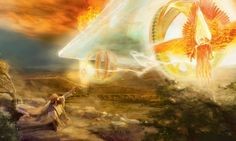
In the earlier chapters (1-6) Ezekiel saw the vision of the glory of God in the plain by the river Kebar in Babylon. The thrust of the vision was that God was behind the judgments that were falling upon Judah. Chapter 7 and underscores that God was in control. (He is pictured enthroned on His chariot of fire). It was God who had transported them into the Babylonian captivity. He did it that they might know that He alone is God.
Ezekiel 7:4 4 And my eye will not spare you, nor will I have pity, but I will punish you for your ways, while your abominations are in your midst. Then you will know that I am the LORD.
Lamar Eugene Cooper in the New American Commentary on the Book of Ezekiel writes:
“By judging Judah in accordance with the standards and punishments declared to them from the beginning in the Mosaic covenant, the Lord would cause them to recognize Him as different from the gods of the nations, a God not to be manipulated or taken for granted, but rather obeyed and trusted wholeheartedly.” (P. 116 NASB Commentary on Ezekiel)
The expression ‘you will know’ (‘then you will know’ or ‘and you shall know’) is found 3 times in Chapter 7 (vv. 4,9, 27).
The concept that the future judgment is inevitable, is communicated using the predictive perfect tense (verses 2, 6). The ‘not yet’ is ‘as good as now’. It is as good as done. The time of patience is over.
The prophet Ezekiel is telling the exiles in Babylon what Jeremiah is telling those still in Jerusalem. The time of waiting is over. The time of recovery is past. The nation had overstepped the boundaries of God’s forbearance.
Ezekiel 7:2 2 “And you, O son of man, thus says the Lord GOD to the land of Israel: An end! The end has come upon the four corners of the land.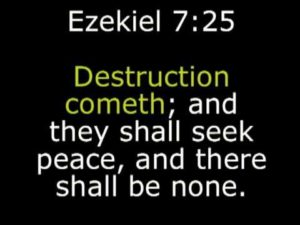
The judgment would be wide-sweeping, not confined to Jerusalem alone. It would extend to the four corners of the entire nation. It would affect every stratum of society, buyer and seller, prince and pauper. Their wealth, education, or social status could not save them from the judgment coming upon them for their sins. No political alliance could provide rescue.
“By their own standards I will judge them. Then they will know that I am the Lord.” (7:27)
In Chapters 8 through 11:25, Ezekiel receives a series of four visions pertaining to the desecration of the temple in Jerusalem. These visions reveal that God sees the hidden and secret sins of the heart.
These visions remind us of what we read yesterday in the Book of Hebrews:
Hebrews 4:13 13 And no creature is hidden from his sight, but all are naked and exposed to the eyes of Him to whom we must give account.
Ezekiel is sitting in his house in Babylon with the elders of Judah who were brought into captivity with him. The date is September 17, 592 B.C. This reference suggests that even in the exile there was some organized structure to community life and corporate worship among the Jews. They were waiting for a word from the Lord to come to Ezekiel. They got more than ‘a word’. ‘The hand of the Sovereign Lord came upon him there.’ Ezekiel then saw a figure as of a man who appeared as fire from the waist down and glowing metal from the waist up. He grabs Ezekiel by the hair of his head and transports him in the spirit to Jerusalem.
The question is- was this a visionary experience or did he return bodily to Jerusalem?
Ezekiel is shown a sequence of scenes exposing the sins of idolatry taking place in the temple in Jerusalem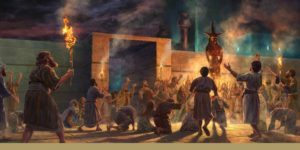
- He is shown ‘the image of jealousy’, a false deity, possibly Asherah, in the temple provoking the holy jealousy of the only true God (8:5-6).
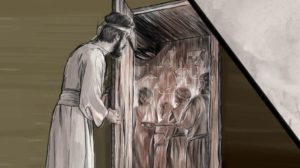
- He is shown the secret cultic worship of animal deities by Israel’s corrupted leaders in hidden chambers in Jerusalem’s temple (8:7-13); Perhaps the secrecy of these meetings was because worship of the animal gods of Egypt was offensive, if not illegal, under Babylonian rule.
- He is shown women weeping for Tammuz, the Babylonian equivalent to Dumuzi (Duzu) the Sumerian god of vegetation, the male consort, the shepherd god, of Inanna, also called Ishtar, (8:14-15). The religious rites surrounding Tammuz worship followed the seasons that depict the death and resurrection of this nature god. In the 4th month, when the vegetation died, the women wept. They were still weeping in the 6th month.
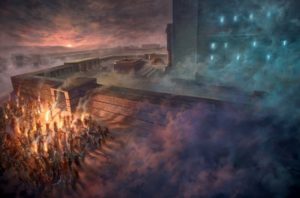
- He is shown 25 men desecrating the inner court worshiping the sun, turning their backs towards the temple (8:16-18). No trivial matter! (The worship of the sun was one of the evil practices introduced by King Manasseh (2 Kings 21:5).
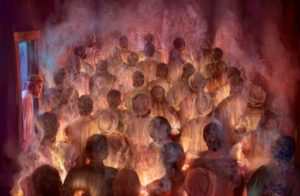
Prior to the fall of Jerusalem in 587/586 BC there was a rise of syncretistic worship, accommodating the pagan practices of Judah’s neighboring nations.
Remember, Solomon allowed his pagan wives to build a temple and altar to their gods (1 Kings 11:1-8). This led to the revival of Baal worship in Israel (1 Kings 16:31-34; 17:1-7) and to the division of the northern and southern kingdoms (1 Kings 11:41-12:33).
Not only was the Lord angered by His people thumbing their noses at Him by conducting idolatrous worship in the temple, but He was angered by the violence in the land.
Ezekiel 8:17 17 Then he said to me, “Have you seen this, O son of man? Is it too light a thing for the house of Judah to commit the abominations that they commit here, that they should fill the land with violence and provoke me still further to anger? Behold, they put the branch to their nose.
“There is some good in all religions” is a false statement. The self-deification of the New Age movement, the revived paganism popular in our culture today, and the embracing of false deities in the name of multiculturalism, are blatant examples of contemporary idolatry and an abomination to God.
Oh, that God’s people would know that He alone is God and that He is the only One who can provide salvation. He does this through providing the gift of His Son.
John 14:6 6 Jesus said to him, “I am the way, and the truth, and the life. No one comes to the Father except through me.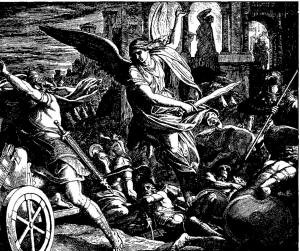
Acts 4:12 12 “And there is salvation in no one else, for there is no other name under heaven given among men by which we must be saved.”
Chapter 9 provides the details for the coming judgment. The executioners here are more than men. They are divine messengers, angels dispensing God’s judgment.
In verse 3 of Chapter 9 we see the first stage of the departure of the glory of the Lord from the sanctuary, a movement which will conclude in Chapter 10 verse 22.
Ezekiel 9:3 3 Now the glory of the God of Israel had gone up from the cherub on which it rested to the threshold of the house. And he called to the man clothed in linen, who had the writing case at his waist.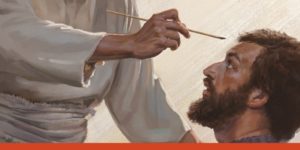
A messenger in white linen was instructed to go through the city and place a mark on the forehead of those who grieve or lament over the detestable things that were being done in the temple, exempting them from judgment. Others would be judged as guilty for accommodating the practices. Those who were spared became a remnant of hope for future restoration.
Judgment being passed over those who have the mark on their foreheads is reminiscent of the Passover Story, where the angel of death passed over those who had the mark of the blood of the Lamb on their doorways (Exodus 12:7,13); the passing over of Rahab’s household in Jericho due to the mark of the scarlet cord hanging from the window; or the passing over those who have received the seal of God on their foreheads (Revelation 9:4) exempting them from utter destruction.
The judgment began in the sanctuary. The religious leaders were even more responsible and consequently were the first to receive punishment for leading the people astray.
TODAY’S READING FROM THE NEW TESTAMENT – HEBREWS 5:1-14
When you consider the superiority of Jesus, our High Priest, to the Old Testament priesthood of Aaron, you will see how it makes no sense to turn away from a living relationship with the Captain of our salvation, the author and finisher of our faith, a perfect Savior, to a chalkboard sketch of Him.
We understand that the priests dealt with the problem of sin by offering the required sacrifices, but they were also to be living representatives of the people in matters related to God. The priest must sympathize with all that it means to be human as well as honor the holiness of God. Jesus qualifies as a greater priest by offering a once and for all sacrifice. He is able to deal with human beings sympathetically because He Himself was God-become-man, and thereby had the capacity to feel what we feel.
Aaron did not appoint himself to the service of the tabernacle. He was called of God. But his service was limited by his limited lifespan. The sacrifices he offered were necessitated by his own sins. Jesus did not take upon Himself the office of King and priest. He was appointed and anointed for a greater office, in that it was not as High Priest alone, but as ‘the Christ’ (anointed King, Priest, Prophet, Judge). He is the Son of the Living God, proclaimed such by the Father. He is designated a Priest after the order of Melchizedek (Hebrews 5:6; Genesis 14:18; Psalm 110:4).
Like the figure Melchizedek, of whom there is no record in history of his beginning of days, or his end of days, Jesus stands apart from Aaron and the Levitical priesthood. Melchizedek’s name means ‘king of righteousness’ and he is the king of Salem (Peace). His kingdom is a kingdom of righteousness and peace. He is more than a king. He is the priest of the Most High God, the one mediator between God and man. He represents God to man, and man to God. He does this by offering Himself.
Abram had been involved in a war in the interest of righteousness and rescue. His fight was on behalf of others. He is met by Melchizedek, the King and Priest who represents the God who called him out of the Ur of the Chaldees and granted him victory over those who stole Lot. Melchizedek has come to bless those who serve the kingdom of righteousness and peace. He offers Abram tokens of Himself and His saving work- a communion meal of bread and wine.
The reading closes with a rebuke. Having progressed to a degree, the Hebrew Christians had become dull of hearing. They degenerated to deafness and infancy. Instead of being teachers, they had need that someone teach them again what they had already been taught. They were not seeing that going back to the Law was regressionism.
TODAY’S READING FROM THE BOOK OF PSALMS- PSALMS 105:1-15;
In the first section, verses 1-4, the Psalmist calls worshipers to give thanks, pray (call on His Name), testify as missionaries (make known among the nations what He has done), sing praises to Him, acknowledging all that He is and all that He has done. We are encouraged to “glory in His holy Name (Boast of Him)”, “rejoice” that He can be found of those who seek Him, and to “Look to Him” for your strength.
In verses 5-15, he calls the worshiper to remember all that He has done for His people. He has made a covenant with Abraham and given them promises. To them He will give the land (v. 11). Through them He will give the Messiah.
But His goodness extends beyond the people of His covenant, for His judgments are in all the earth. He had a special role for His prophets and used them to speak to the nations, even rebuking kings.
TODAY’S READING FROM THE BOOK OF PROVERBS – PROVERBS 26:28
Proverbs 26:28 28 A lying tongue hates its victims, and a flattering mouth works ruin.
PRAY FOR THE NATIONS- SPAIN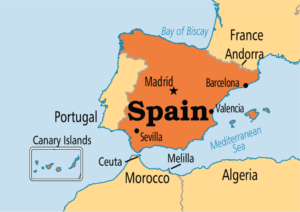
(from Operation World Prayer Guide, p. 764-768)
Spain had an amazing transformation after 1978. It abandoned a dictatorship for democratic rule, moved from poverty towards wealth, integrated into Europe, and increased religious freedom. But economic progress also brought greed for possessions and self-indulgent lifestyles. Sexual immorality, prostitution, and abortion now are common, and Spain has one of the lowest birth rates in the world. These problems combine with depression, debt, and disease to create future problems for society. Pray for Spain to wake up to the lies that have blinded it to the truth of the gospel.
There is a lack of unity in the nation as many in the Catalan district in the northeast are seeking independence. There is a similar movement in the Basque region in the Northwest.
Evangelical numbers have grown, but not as fast or in the ways hoped for. Many evangelical churches are concentrated in Catalonia (especially Barcelona), along the east coast, in Andalucía and in the areas around Madrid. Pray for:
- a) Revival. Spain has never experienced a national outpouring of the Holy Spirit in revival, and, as secular attitudes predominate, the general spiritual atmosphere is drier than ever.
- b) Greater cooperation among denominations. Unity is actually a positive point overall, but deliberate cooperation is scarce.
While many of the older churches were planted by Spanish workers, many newer congregations imported Anglo-Saxon dynamics and structures. Many evangelicals are Gypsies, Latin-Americans, Eastern Europeans, Africans and other foreigners. Pray for a better perception of Christianity by Spaniards. The media can be quite hostile.
Pray for leadership training. Few churches can afford to pay for a full-time pastor, let alone a team of them. Pray that training schools would be filled with young Spanish future leaders, shaped by solid instruction in the Word of God.
PRAYER: Lord, You know us inside and out. You know the idol-making capacities of every heart. We ask for Your forgiveness for any personal allegiance that competes with our devotion to You. Anchor our affections to that which is real and eternal. Let us hold fast to the truth as it is in Christ Jesus. We desire to live as fully devoted worshipers, offering You heart-felt praise. We ask that You fill us with Your Spirit and the boldness to make known the good news of Your plan of salvation. In Jesus’ Name. Amen.
- Pastor David
